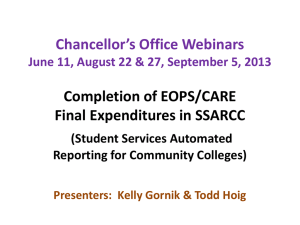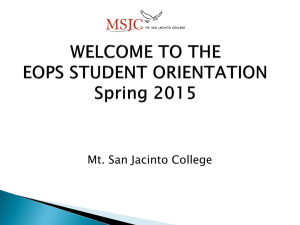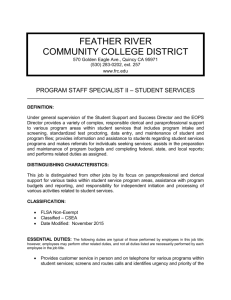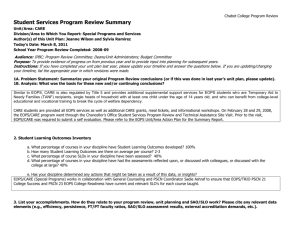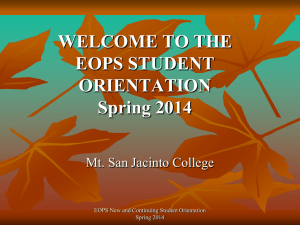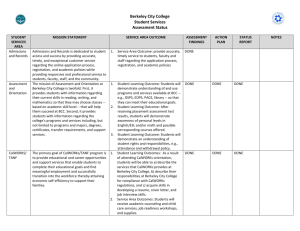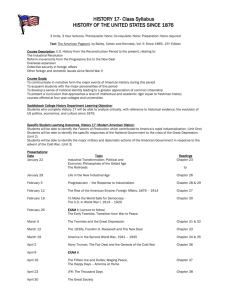state of california - California Community Colleges Chancellor`s Office
advertisement
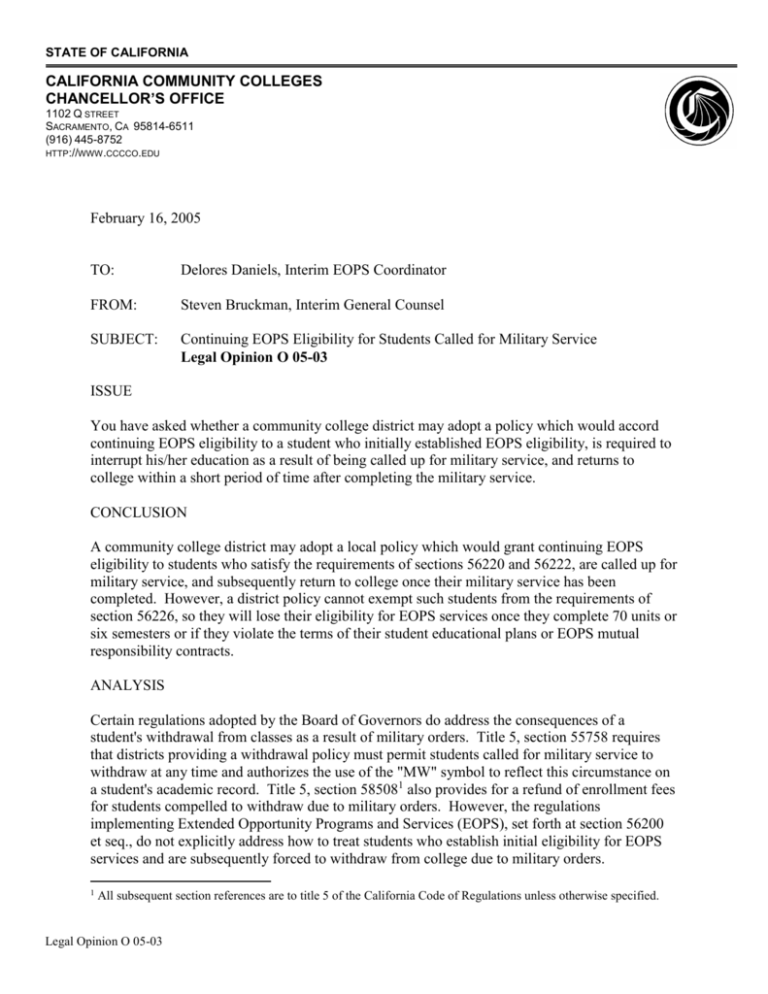
STATE OF CALIFORNIA CALIFORNIA COMMUNITY COLLEGES CHANCELLOR’S OFFICE 1102 Q STREET SACRAMENTO, CA 95814-6511 (916) 445-8752 HTTP://WWW .CCCCO.EDU February 16, 2005 TO: Delores Daniels, Interim EOPS Coordinator FROM: Steven Bruckman, Interim General Counsel SUBJECT: Continuing EOPS Eligibility for Students Called for Military Service Legal Opinion O 05-03 ISSUE You have asked whether a community college district may adopt a policy which would accord continuing EOPS eligibility to a student who initially established EOPS eligibility, is required to interrupt his/her education as a result of being called up for military service, and returns to college within a short period of time after completing the military service. CONCLUSION A community college district may adopt a local policy which would grant continuing EOPS eligibility to students who satisfy the requirements of sections 56220 and 56222, are called up for military service, and subsequently return to college once their military service has been completed. However, a district policy cannot exempt such students from the requirements of section 56226, so they will lose their eligibility for EOPS services once they complete 70 units or six semesters or if they violate the terms of their student educational plans or EOPS mutual responsibility contracts. ANALYSIS Certain regulations adopted by the Board of Governors do address the consequences of a student's withdrawal from classes as a result of military orders. Title 5, section 55758 requires that districts providing a withdrawal policy must permit students called for military service to withdraw at any time and authorizes the use of the "MW" symbol to reflect this circumstance on a student's academic record. Title 5, section 585081 also provides for a refund of enrollment fees for students compelled to withdraw due to military orders. However, the regulations implementing Extended Opportunity Programs and Services (EOPS), set forth at section 56200 et seq., do not explicitly address how to treat students who establish initial eligibility for EOPS services and are subsequently forced to withdraw from college due to military orders. 1 All subsequent section references are to title 5 of the California Code of Regulations unless otherwise specified. Legal Opinion O 05-03 Delores Daniels 2 February 16, 2005 Nevertheless, we think your question can be answered by a careful reading of the EOPS regulations. Section 56220 sets forth the requirements a student must meet to demonstrate initial eligibility for EOPS services. For purposes of this analysis we will assume that the students in question have satisfied these requirements. Section 56222 then goes on to describe subsequent steps a student must take to remain eligible. It provides: 56222. Student Responsibility. To remain eligible to receive programs and services, students shall: (a) apply for state and/or federal financial aid pursuant to the applicable rules and procedures of the college of attendance. (b) maintain academic progress towards a certificate, associate degree, or transfer goal pursuant to the academic standards established by the college of attendance applicable to all credit enrolled students. (c) file an initial EOPS application and complete and adhere to a student educational plan and an EOPS mutual responsibility contract for programs and services. (d) within two months of acceptance into the EOPS program, provide income documentation from state or federal income tax forms, or public assistance documentation pursuant to Section 58620 (2) of this part, or other documentation as required for financial aid by the college of attendance. It would appear that a student called up for military service could remain eligible for EOPS if these requirements were satisfied. Two points deserve some special mention. First, subsection (b) of section 56222 requires that the student maintain progress toward an academic goal consistent with district policies for academic progress for all students. This might be thought to represent a problem if a student has to withdraw in the middle of a term due to military orders. However, section 55758 specifically provides that military withdrawal is to be disregarded in determining whether a student meets standards for academic or progress probation. Thus, even if a student is forced to withdraw in the middle of a term, this would not prevent him or her from being able to satisfy the requirement of subsection (b) of section 56222 relating to maintaining progress toward an academic goal. Second, subsection (c) of section 56222 requires that the student submit and adhere to a student educational plan and an EOPS mutual responsibility contract. Of course, if the educational plan or mutual responsibility contract provided that the student must be continuously enrolled, he or she would not be able to adhere to the plan/contract when called up for military service. However, a district certainly could allow a student to amend his or her educational plan and EOPS mutual responsibility contract to reflect that he or she would return to college as soon as possible after military service. So, this does not present a barrier in a district which wishes to adopt a policy permitting those returning from military service to be treated as continuing students for purposes of EOPS eligibility.2 2 Subsection (d) of section 56222 requires a student to submit information regarding his or her income, but this is a one-time obligation which must be satisfied "within two months of acceptance into the EOPS program." It is Legal Opinion O 05-03 Delores Daniels 3 February 16, 2005 However, we must now consider the impact of section 56226 which imposes limitations on continuing eligibility. It provides: 56226. Limitations on Eligibility. A student who has met the eligibility requirements of Sections 56220 and 56222, and who participates without term-to-term interruption, shall continue to be eligible until the student: (a) has completed 70 degree applicable credit units of instruction, or has completed consecutively six semester terms or nine quarter terms of enrollment. Time spent by the student enrolled in remedial courses, including remedial level English as a Second Language courses, shall not be included when computing the requirements of this sub-section. The EOPS Director may waive this limitation only in cases where students are enrolled in programs which require more than 70 units, or which require prerequisites that would exceed the limitations. (b) has failed to meet the terms, conditions, and follow-up provisions of the student education plan and/or the EOPS mutual responsibility contract. At first glance it may appear that sections 56222 and 56226 both address the same subject because one refers to what a student must do to "remain" eligible for EOPS and the other describes under what circumstances a student will "continue" to be eligible. However, we think there is an important distinction between the two. Section 56226 is clearly intended to impose restrictions on continued eligibility even where a student has satisfied the requirements of sections 56220 and 56222 and has been continuously enrolled. Conversely, section 56226 essentially provides a guarantee that a student who has satisfied the requirements of sections 56220 and 56222 and remains continuously enrolled will continue to be eligible for EOPS services until he or she has completed 70 units or six consecutive semesters of credit coursework. What section 56226 does not do is to address the situation faced by a student who is called up for military service and must therefore interrupt his or her education. Such a student is not guaranteed continuing EOPS eligibility under section 56226 because he or she cannot satisfy the requirement for participation "without term-to-term interruption." On the other hand, this means that the EOPS regulations do not dictate the treatment of students who satisfy the requirements of sections 56220 and 56222 but do not maintain continuous enrollment. Education Code section 70902 provides that a community college district may "initiate and carry on any program, activity, or may otherwise act in any manner that is not in conflict with or inconsistent with, or preempted by, any law and that is not in conflict with the purposes for which community college districts are established." Thus, we conclude that a community college district is free to adopt local policies it deems appropriate related to certainly true that a student’s income may vary over time and we understand that it is common practice to require students to submit new income information after a break in enrollment. This may be an appropriate way to make prudent use of limited resources, but there does not appear to be any legal requirement for such a practice. However, section 56254 does appear to require annual reassessment of student income as a condition of receiving EOPS financial aid since it provides, "No combination of EOPS grant and workstudy awards may exceed $1,800 or exceed the amount of a student's unmet need, whichever is less in an academic year." Legal Opinion O 05-03 Delores Daniels 4 February 16, 2005 continuing EOPS eligibility for students who satisfy the requirements of sections 56220 and 56222 but do not remain continuously enrolled. Normally one would expect such local policies to treat all similarly situated students in the same way, but unless a district used discriminatory criteria, we see no reason why a district could not accord continuing EOPS eligibility status to some students who return after an interruption in their education and deny it to others. Consequently, we believe a community college district could adopt a local policy which would grant continuing EOPS eligibility to students who satisfy the requirements of section 56220 and 56222, are called up for military service, and subsequently return to college once their military service has been completed. Of course, a district cannot exempt such students from the requirements of section 56226, so they will lose their eligibility for EOPS services once they complete 70 units or six consecutive semesters or if they violate the terms of their student educational plans or EOPS mutual responsibility contracts. However, a local district policy could accord continuing EOPS eligibility to such students until one of the circumstances specified in section 56226 occurs. SB:RB:sj O 05-03 Legal Opinion O 05-03
